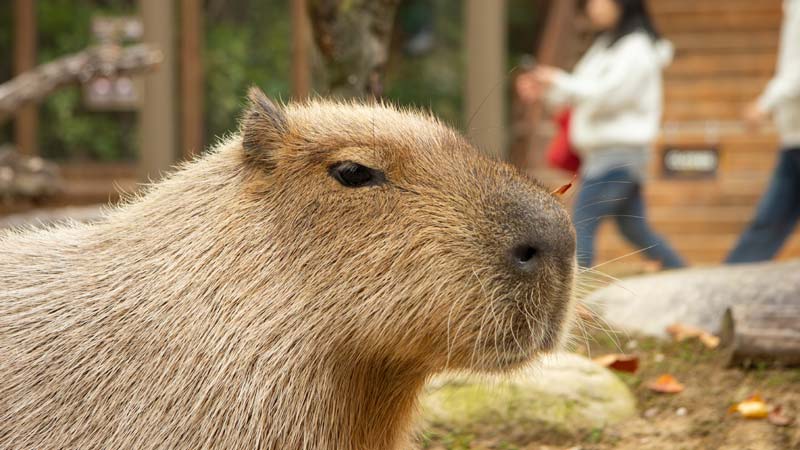- Size
- Smallest
- Small
- Small to Medium
- Medium
- Large
- Giant
- Characteristics
- Smartest
- Hypoallergenic
- Fluffy
- Best Guard
- Best Family
- Best for Kids
- Low Shedding
- Healthiest
- Police Dogs
- Most Calm
- Quietest
- Color
- White
- Black
- Grey
- Brown
- Blue
- Red
- Coat
- Hairless
- Short
- Long
- Origin
- Japan
- China
- Australia
- Germany
- Italy
- United States
- France
- Group
- Hound
- Terrier
- Herding
- Toy
- Working
- Sporting
The Ultimate Guide to Capybara Ownership: Is It Right for You?

Photo by Hoyoun Lee on Unsplash
The idea of owning a capybara, the world's largest rodent, as a pet might seem fascinating to animal enthusiasts. However, diving into capybara ownership entails a myriad of considerations—legal, ethical, and practical—before welcoming these social, aquatic creatures into your home.
Legal Landscape: Where Can You Own a Capybara?
The legality of keeping capybaras as pets varies significantly based on geographical location. Some regions have stringent regulations or outright bans, while others may require permits or specific health certificates for ownership. Understanding your local laws and regulations regarding exotic pets is crucial.
For instance, in California and Georgia, capybaras are prohibited as pets. However, in Texas, Pennsylvania, and New York (with exceptions), ownership might be permissible. Even within states allowing ownership, certain cities or boroughs, like the five boroughs of New York City, might have specific regulations against capybara ownership.
States like Texas, Washington, North Carolina, Arizona, Arkansas, Indiana, Florida, and Tennessee have more lenient laws, allowing individuals to keep capybaras as pets, provided they adhere to specific guidelines and requirements.
Ethical Considerations: The Reality of Capybara Ownership
Owning a capybara transcends legal constraints—it's about ethical responsibility and ensuring the animal's well-being. Capybaras are colossal creatures, weighing approximately 170 pounds each. Their natural habitat and social behavior make them more suited to expansive environments akin to those found in professional zoos.
Environmental Requirements
Capybaras need ample living space that includes aquatic environments to thrive. They are highly social animals, often faring better in pairs. Housing a solitary capybara might not meet its social and emotional needs. It's imperative to provide an environment conducive to their well-being, considering their need for companionship and ample space to roam and swim.
Pairing Dynamics
Pairing capybaras requires careful consideration. While they thrive in pairs, male capybaras, even when neutered, might display territorial or aggressive behavior towards each other. Optimal pairings often involve two females or a male-female pair.
Practical Considerations: Cost, Commitment, and Challenges
Financial Commitment
The financial aspect of owning a capybara cannot be overstated. These animals entail substantial expenses, covering not only their initial purchase but also ongoing costs for food, veterinary care, habitat construction, and maintenance. An owner must be prepared for potentially high veterinary bills, given the limited availability of specialists experienced in treating capybaras.
Space Requirements
Capybaras necessitate a considerable amount of space. A suitable enclosure should mimic their natural habitat, offering both land and water areas. Adequate space allows for their social interactions and swimming needs. Individuals unable to provide such extensive living arrangements might reconsider owning a capybara.
Commitment and Responsibility
Caring for capybaras demands a significant commitment. Their lifespan in captivity can range from 8 to 10 years, requiring consistent care, attention, and dedication. Daily maintenance involves feeding, cleaning, and providing mental stimulation and social interaction to ensure their well-being.
Specialist Care
Finding veterinarians with expertise in capybara care might pose a challenge. Potential owners should ensure accessibility to specialized veterinary services before considering owning these exotic pets.
Conclusion: Is a Capybara the Right Pet for You?
Owning a capybara isn't merely about acquiring an exotic pet; it's a substantial responsibility. The decision to welcome these remarkable creatures into your home requires a thorough consideration of legalities, ethical implications, and practical aspects.
Individuals contemplating capybara ownership must assess their ability to meet stringent space and social requirements, navigate legal regulations, commit to significant financial obligations, and ensure access to specialized veterinary care.
Ultimately, the well-being of the capybara hinges on the owner's capacity to provide a nurturing, species-appropriate environment. Proper research, preparation, and a genuine dedication to meeting the needs of these unique animals are paramount in making an informed and ethical decision regarding capybara ownership.
You May Also Like
 Help & AdviceTraveling with Pets: Tips for Stress-Free Journeys
Help & AdviceTraveling with Pets: Tips for Stress-Free Journeys Cat HealthThese 10 Types of Food Dogs Better Not Eat!
Cat HealthThese 10 Types of Food Dogs Better Not Eat! Dog HealthThe 10 Breeds More Prone to Food Allergies
Dog HealthThe 10 Breeds More Prone to Food Allergies Help & AdvicePawsitive Health Habits: A Guide to Keeping Your Dog in Top Shape
Help & AdvicePawsitive Health Habits: A Guide to Keeping Your Dog in Top Shape Useful AccessoriesThe Pros and Cons of Using a Halo Collar for Dog Training
Useful AccessoriesThe Pros and Cons of Using a Halo Collar for Dog Training Breed Reviews8 Great Choices: Best Medium-sized Dogs For Beginners
Breed Reviews8 Great Choices: Best Medium-sized Dogs For Beginners